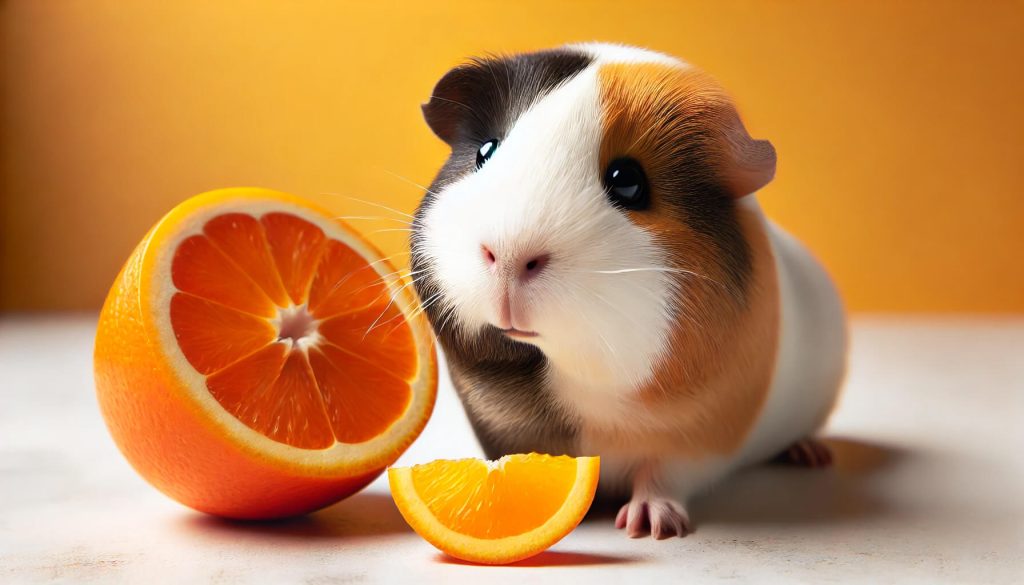
Can Guinea Pigs Eat Orange?
Understanding Guinea Pigs’ Diet
Knowing what to feed your guinea pig is crucial for its health and happiness. A balanced diet ensures your pet thrives and remains energetic.
What Do Guinea Pigs Normally Eat?
Guinea pigs primarily eat hay, which should make up about 80% of their daily diet. Timothy hay is commonly recommended due to its high fiber content and low calcium levels, promoting digestive health and preventing bladder stones. Alongside hay, guinea pigs need fresh vegetables like bell peppers, leafy greens (e.g., kale, romaine lettuce), and occasional root vegetables (e.g., carrots). Additionally, pelleted guinea pig food fortified with vitamin C is essential because guinea pigs cannot produce this vitamin themselves. Avoid seed mix diets as they can lead to selective feeding and nutritional deficiencies.
Special Dietary Considerations for Guinea Pigs
Guinea pigs need a continuous supply of fresh water, preferably from a sipper bottle to ensure cleanliness. Vitamin C is a crucial component of their diet; without it, guinea pigs risk developing scurvy. Offering small portions of fruits high in vitamin C, like oranges, can provide a beneficial supplement. However, due to their sugar content, fruits should be given sparingly. Introduce new foods gradually to monitor any adverse reactions. Avoid iceberg lettuce and foods high in calcium or oxalates, as they can cause bladder stones. Steer clear of toxic foods like onions, garlic, and chocolate to keep your pet safe.
Can Guinea Pigs Eat Oranges?
Yes, guinea pigs can eat oranges, but moderation and caution are key. Oranges offer essential nutrients but also come with potential risks.
Benefits of Oranges for Guinea Pigs
Oranges provide several benefits to guinea pigs:
- Vitamin C: Oranges are rich in vitamin C, crucial for guinea pigs as they can’t produce this vitamin. Regular intake helps prevent scurvy.
- Antioxidants: These fruits contain antioxidants that enhance immune function and overall health.
- Hydration: Oranges have high water content, contributing to hydration, particularly in warmer conditions.
Potential Risks of Feeding Oranges to Guinea Pigs
Feeding oranges to guinea pigs also presents some risks:
- Sugar Content: Oranges contain high sugar levels, which can lead to obesity and dental problems. Limit serving size to small slices.
- Acidity: The acidic nature of oranges might cause mouth sores or gastrointestinal upset in some guinea pigs. Monitor for adverse reactions.
- Pesticides: Wash oranges thoroughly to remove residual pesticides that could harm your pet.
When introducing oranges, start with small quantities, and observe any reactions. If there are no negative effects, oranges can be an occasional treat enhancing their diet.
How to Safely Introduce Oranges to Your Guinea Pig’s Diet
Guinea pigs can enjoy oranges, but it’s crucial to introduce them safely to their diet. Consider the following guidelines to ensure your pet stays healthy and happy.
Portion Size and Frequency
Feed your guinea pig small portions of orange. Start with a single, small wedge or a thin slice. Limit oranges to once or twice a week to avoid excessive sugar intake and acidity.
Preparation Tips for Feeding Oranges
Wash oranges thoroughly to remove pesticides. Peel the orange, removing seeds and pith, then cut it into small, manageable pieces. Place the prepared pieces in your guinea pig’s food bowl and observe for any adverse reactions.
Alternative Vitamin C Sources for Guinea Pigs
Guinea pigs can’t produce their own vitamin C, so you must provide it through their diet. Here are some alternatives to oranges that are rich in vitamin C:
- Bell Peppers: Both red and green bell peppers contain high levels of vitamin C. Feed a small slice daily to ensure a consistent vitamin supply.
- Kale: Kale is another great source. Offer a few leaves, but limit to a couple of times per week due to its high calcium content.
- Parsley: Fresh parsley is rich in vitamin C. Include a small sprig in their diet a few times per week.
- Broccoli: Broccoli florets provide a good amount of vitamin C. Offer small portions to avoid gas and bloating.
- Strawberries: These fruits are both a treat and a vitamin C source. Feed a slice twice a week.
- Spinach: Although high in oxalates, spinach leaves contain vitamin C. Offer in moderation, mixed with other leafy greens.
- Tomatoes: Cherry tomatoes are another option. Give one or two pieces a week, ensuring they’re pesticide-free.
These items can diversify your guinea pig’s diet while ensuring they receive the necessary nutrients. Always introduce new foods gradually, monitoring for any adverse reactions. Rotate these sources to maintain a balanced diet throughout the week.
Conclusion
Feeding your guinea pig a balanced diet rich in vitamin C is crucial for their health. While oranges can be a tasty treat, they should be given in moderation due to their high sugar content. To keep your guinea pig happy and healthy, consider incorporating other vitamin C-rich foods like bell peppers, kale, and strawberries into their diet. Always introduce new foods gradually and keep an eye out for any adverse reactions. By diversifying their diet with safe and nutritious options, you’ll ensure your furry friend gets the nutrients they need without compromising their well-being.
